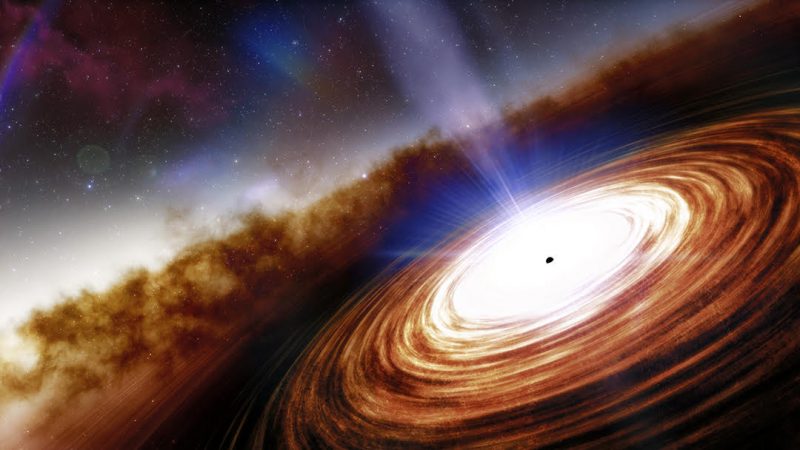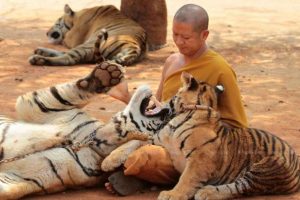
Falling into the Three Wretched Realms
Where do we go after we die? According to the Law of Cause and Effect, as taught by all Buddhas, our destiny is determined by the karma accumulated in our past lives.
As ordinary beings accumulate more offenses due to greed, hatred, and delusion, and possess fewer virtues, it is likely that they will fall into the realms of hungry ghosts, hell, or animals—known as the Three Wretched Realms.
Not many can be reborn in the human realm again, and only a few can ascend to the heaven realm. Thus, the Buddha says:
The chance of gaining a human body is as few as sand grains in my palm, but the chance of losing it as great as all the flecks of soil in this vast land.
In the last two articles, we discuss Amitabha Buddha’s 1st and 2nd Vows that prevent us from ever again falling in the Three Wretched Realms once we attain rebirth in the Land of Bliss. These two vows made by Amitabha Buddha relieve us from the fear of reincarnation in the cycle of birth-and-death.
All living beings are the same in bodily form and equal in beauty
In this article, we will consider Amitabha’s 3rd and 4th Vows, which read as follows.3rd Vow:
If, when I attain Buddhahood, humans and devas in my land should not all be the color of pure gold, may I not attain perfect Enlightenment.
This is known as “The Vow of Golden Complexions.” 4th Vow:
If, when I attain Buddhahood, humans and devas in my land should not all be of one appearance, and should there be any difference in beauty, may I not attain perfect Enlightenment.
This is known as “The Vow of No Differentiation of Physical Beauty and Ugliness.” These two vows are related to the external form of the body, including color and appearance of the inhabitants in Amitabha’s Land of Bliss. For most human beings in the Land of Saha, physical appearance is a major concern.
Referring to these two vows, it should be noted that all living beings in the Land of Bliss share the same skin color and are equal in their physical beauty. They are splendid and perfect, the same as Amitabha Buddha in these characteristics.
Amitabha’s 21st Vow says:
If, when I attain Buddhahood, humans and devas in my land should not all be endowed with the thirty-two physical characteristics of a Great Man, may I not attain perfect Enlightenment.
In other words, all of them have thirty-two physical characteristics and eighty kinds of goodness and splendour, like the Buddha. There is neither gender discrimination, nor racial discrimination due to skin color in the Land of Bliss.
The same reward resulting from the same cause
Master Tanluan explains in the Commentary on Treatise of Rebirth:
In his Land, everyone is born from the pure lotus flower of the Thus Come One. The relatives and retinues are equal and no dispute will arise.
Master Tanluan also says:
All living beings are reborn by manifestation, to be Amitabha’s lotus flower of perfection, enlightenment, and purity, as the cause of their rebirth is the same – Amitabha-recitation alone.
Thus, all living beings in the Pure Land possess the same infinite splendor, infinite light, infinite life, infinite wisdom, and infinite compassion, because they receive the same infinite merit and virtues contained within Amitabha’s Name. All these are attained naturally, without any obstruction.
Text about the accomplishment of Amitabha’s 3rd Vow and 4th Vow
In the Infinite Life Sutra, it says:
That Buddha-land, like the realm of unconditioned nirvana, is pure and serene, resplendent and blissful. The Sravakas, Bodhisattvas, heavenly beings and humans there are lofty and brilliant wisdom, and are masters of supernatural powers.
They are called “heavenly beings” and “humans” in accordance with their state of existences in former lives, but are all of one form with any difference separating them. They are of noble and majestic countenance, rare in all the worlds.
Their appearance is superb, unmatched by any heavenly beings and humans. They are endowed with bodies of Naturalness, Emptiness and Infinity.
These lines are very profound, for they mean that living beings in the Land of Bliss have realized the state of Nirvana. They have achieved and completed the Buddhist Way. Their life is eternal in the Land of Bliss.
In the scriptures, Shakyamuni Buddha compares the bodily appearance and the countenance of five different kinds of living beings—the human king, the Majestic Wheel-Turning King, the Heavenly King of Trayatrimsa, the King of the Sixth Heaven, and those in the Land of Bliss.
Why does Shakyamuni Buddha make this comparison? It is because the Buddha knows ordinary beings like us have strong delusional attachments to the existence of the physical body. So, Shakyamuni hopes to arouse our admiration for the most superb bodily appearance, surpassing all beings in any world.
Amitabha’s calling: Come to my Land upon hearing my Name to become a Buddha
Amitabha Buddha calls out to us continually:
All sentient beings in the Three Wretched Realms, please come to my Land of Bliss upon hearing my Name—Namo Amituofo. By receiving the merit and virtues contained in my Name, you will soon become Buddhas.
It is Amitabha’s compassionate vow to save all of us from sufferings. He says in the Adornment Sutra:
If I attain the perfect Enlightenment, my Buddha Name will be Infinite Life. All sentient beings who hear my Name can come to my Land.
They receive the fullness of joy. Moreover, their body will be golden in color like Amitabha Buddha, and their forms will be splendid, perfect, and complete. They will have all kinds of paranormal powers.
Last but not the least, they have the same awesome power to deliver sentient beings with the same wisdom and compassion as Amitabha Buddha. We’ll discuss this in the next article.
Related features from Buddhistdoor Global
Does Life End upon Rebirth in the Land of Bliss?
The Deep Meaning of Amitabha’s First Vow
Situating Amitabha’s 18th Vow Among the 48 Vows







Namo Amitofu!!! Pure Land is near